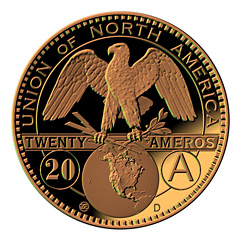 |
 |
 |
 Editorials | Issues | November 2007 Editorials | Issues | November 2007  
Economists Debunk 'Amero' Story
 Eunice Moscoso - The Atlanta Journal-Constitution Eunice Moscoso - The Atlanta Journal-Constitution
go to original


| | Economists say that creating a regional currency for the United States, Canada and Mexico is highly unlikely, primarily due to domestic politics. |
Washington — Former Mexican President Vicente Fox predicted recently that all countries in the Americas would eventually have a common currency, much like the euro.

With conspiracy theories running rampant on the Web about a secret plan to create a North American Union with an "Amero" currency, the comment in a TV interview sent chills through some conservative circles.

Economists say, however, that creating a regional currency for the United States, Canada and Mexico is highly unlikely, primarily due to domestic politics.

Peter B. Kenen, a senior fellow for international economics at the Council on Foreign Relations, a think tank based in New York, said it would never happen.

Kenen, author of the upcoming book "Regional Monetary Integration," said a handful of economists have proposed a common currency for North America, but that most dismiss the notion.

One major problem is the three countries would need to share a central bank. In other words, the United States would need to agree to have Mexicans and Canadians on the Federal Reserve Board and give those countries approval rights over the Fed chair, Kenen said.

"Would the chairman of the Federal Reserve system have to appear before the Canadian parliament and the Mexican parliament?" he said. "That is something which I think the U.S. Congress would look at as absolute madness."

The prospect raises major issues of national sovereignty, said Peter Cappelli, director of the Center for Human Resources at the University of Pennsylvania's Wharton School.

Cappelli said it would likely be economically advantageous for the United States, Canada and Mexico to move toward a common currency, but that it's "nearly impossible" politically.

A large number of Americans have a problem with the United States participating in the United Nations, he said. "So the idea that we would lose or give up at last part of our control over fundamental issues of money supply which affect the economy would be pretty hard for the country to swallow."

The idea of the Amero has been around for some time.

In 1999, Canadian economist Herbert G. Grubel wrote a paper titled "The Case for the Amero: The Economics and Politics of a North American Monetary Union."

More recently, Robert A. Pastor, a professor of international relations at American University in Washington, published a paper in 2005 that argued for North American economic integration.

Pastor proposed that the three countries establish a North American Advisory Council with 15 "distinguished individuals," five from each country. The council would "encourage the three governments to respond to a continental vision."

Pastor, who previously held several posts with the Carter Center in Atlanta, also said the three countries should create a North American Investment Fund in which to deposit $20 billion a year for a decade for work on roads, ports, railroads and communications to connect the southern part of Mexico with the North American market.

Proponents of economic integration and a regional currency for the Americas point to the euro, generally regarded as a success.

The academic discussion about North American integration has made its way to the political stage.

Last month, a GOP presidential candidate, Rep. Ron Paul of Texas, told a group of Evangelical Christians that the United States is working on eliminating its borders "with a North American Union" and "the introduction of an Amero currency." | 
 | |
 |



